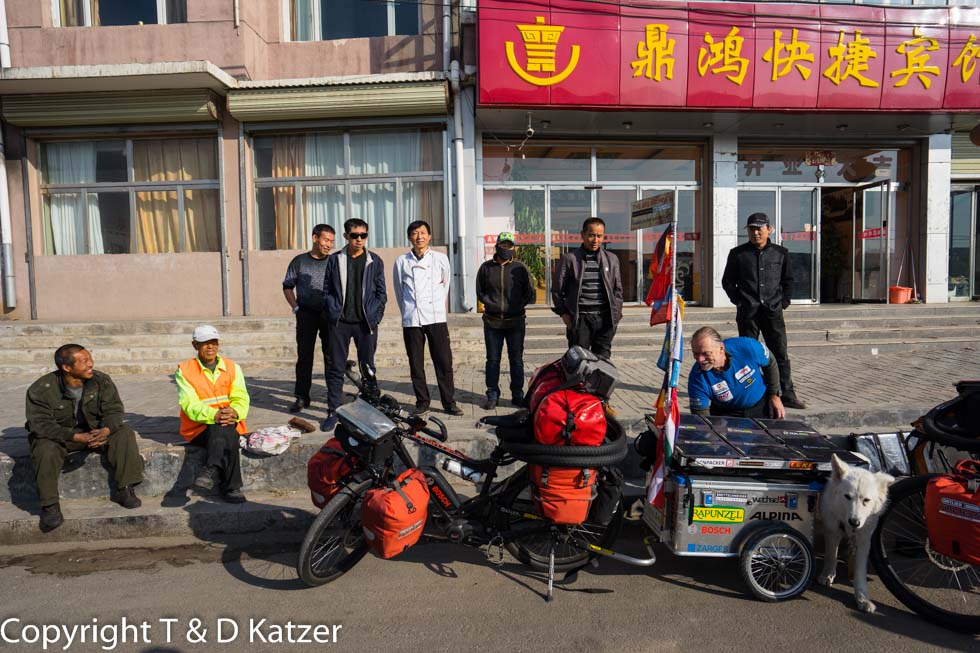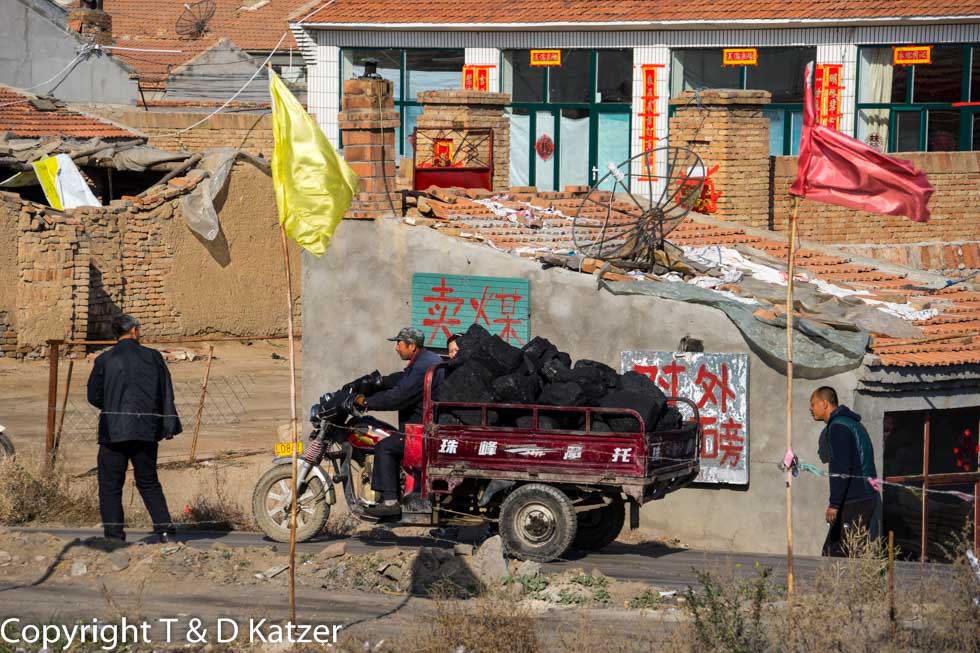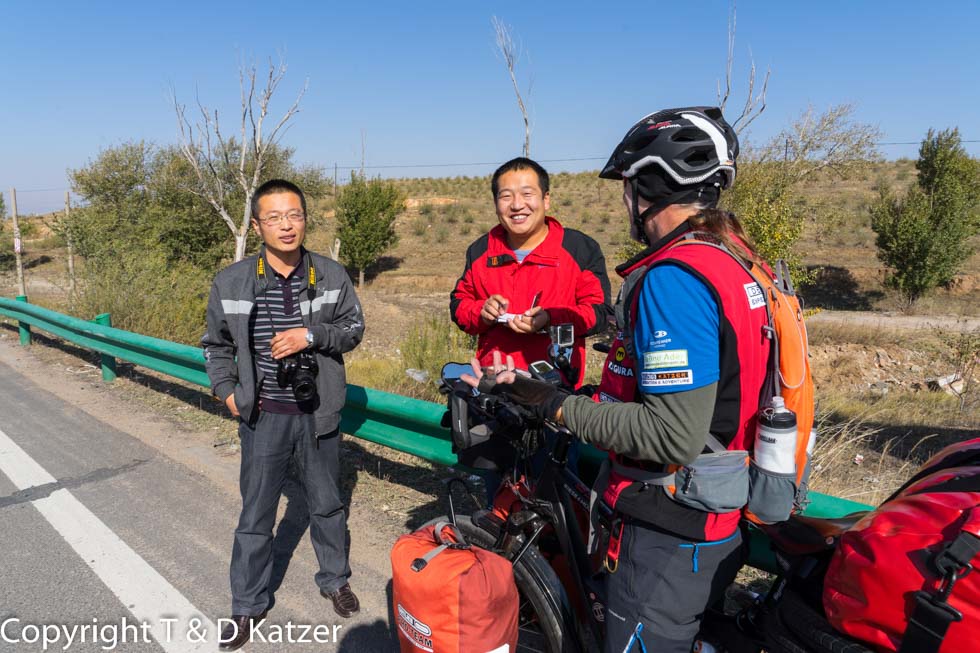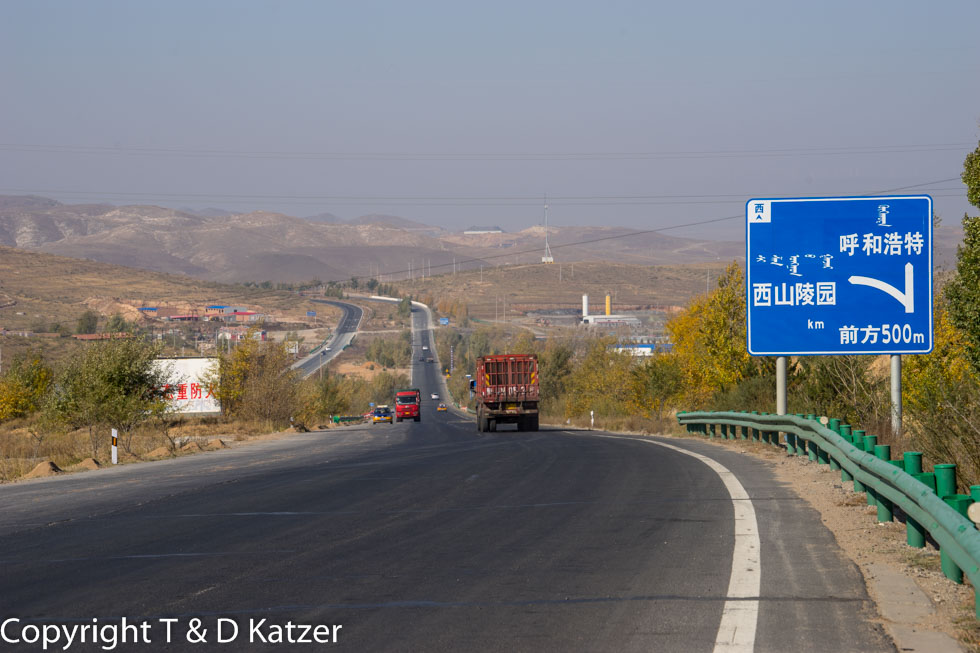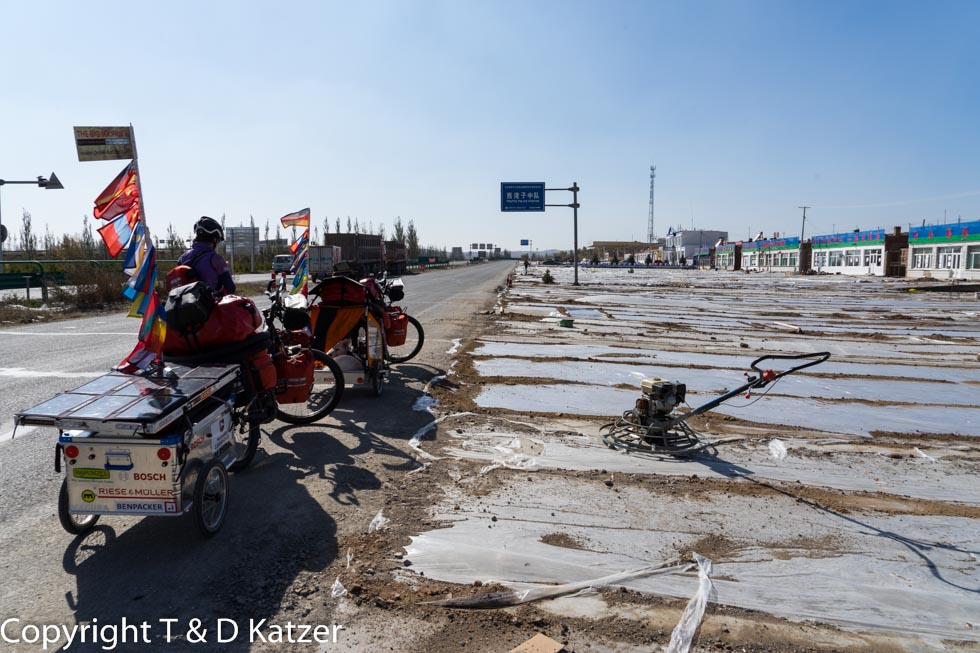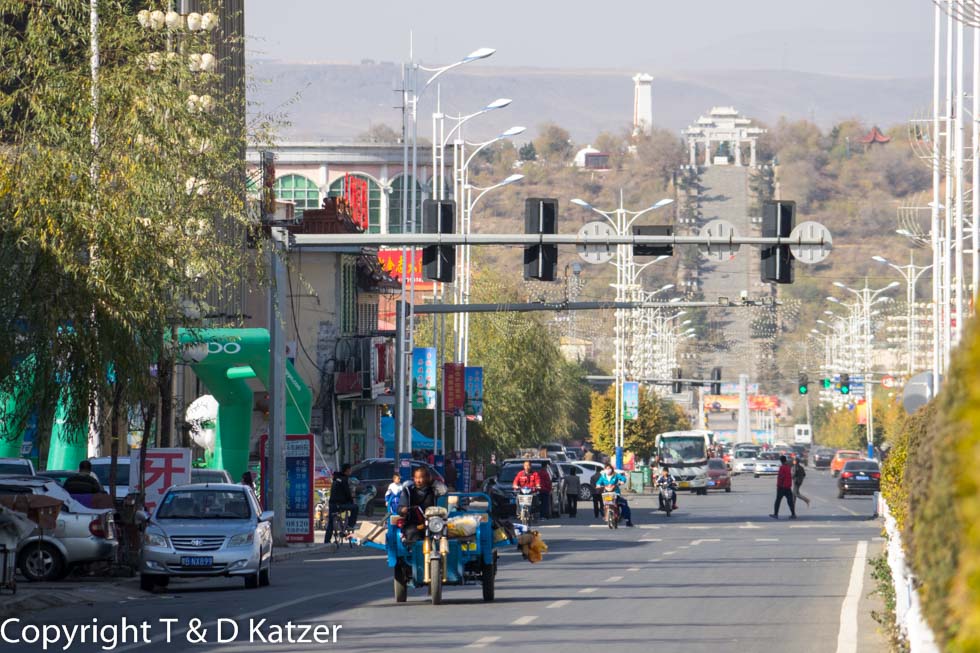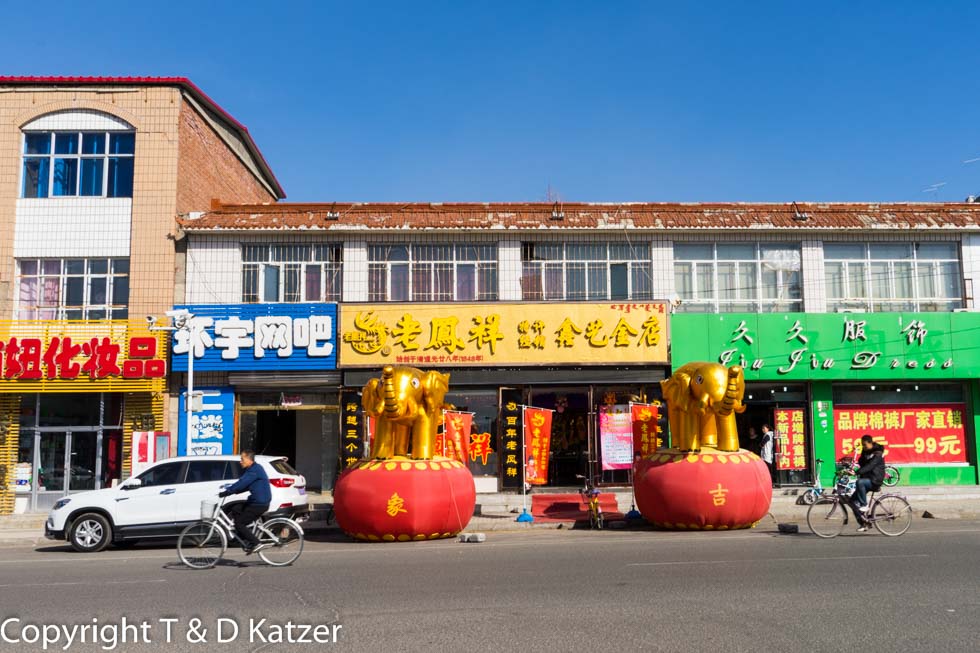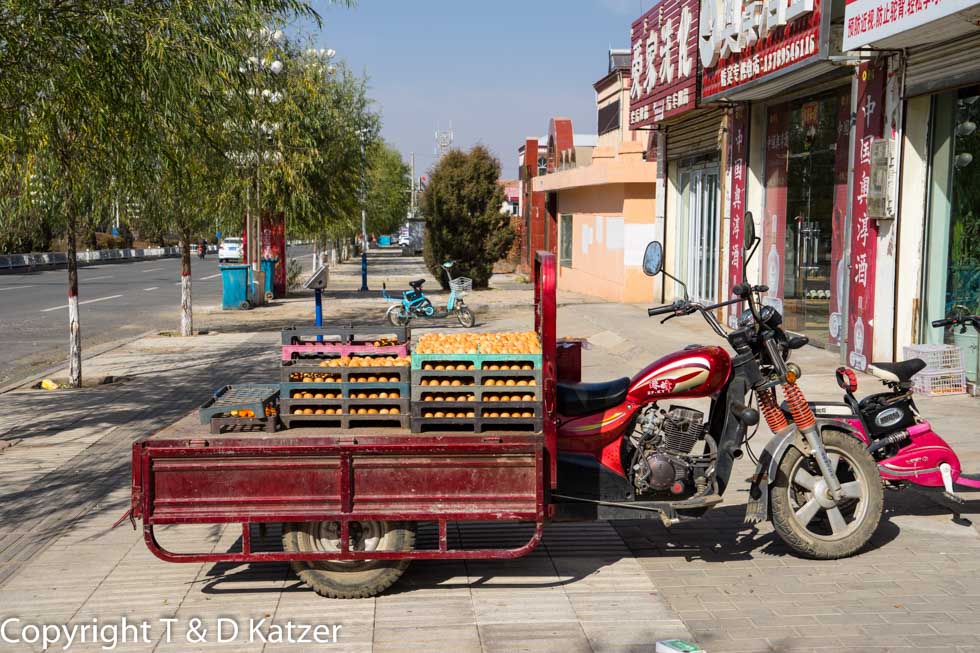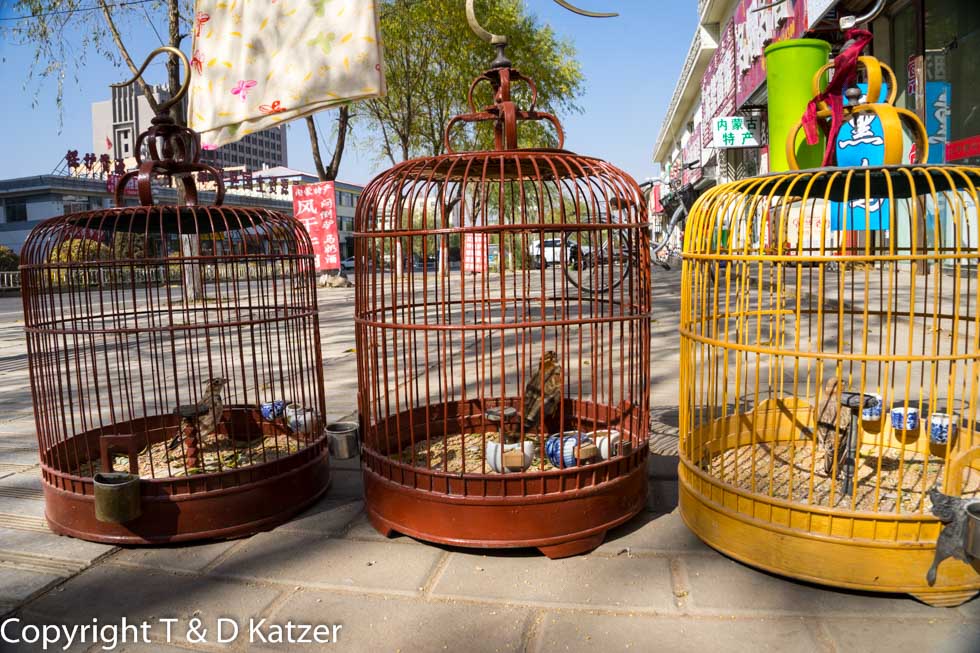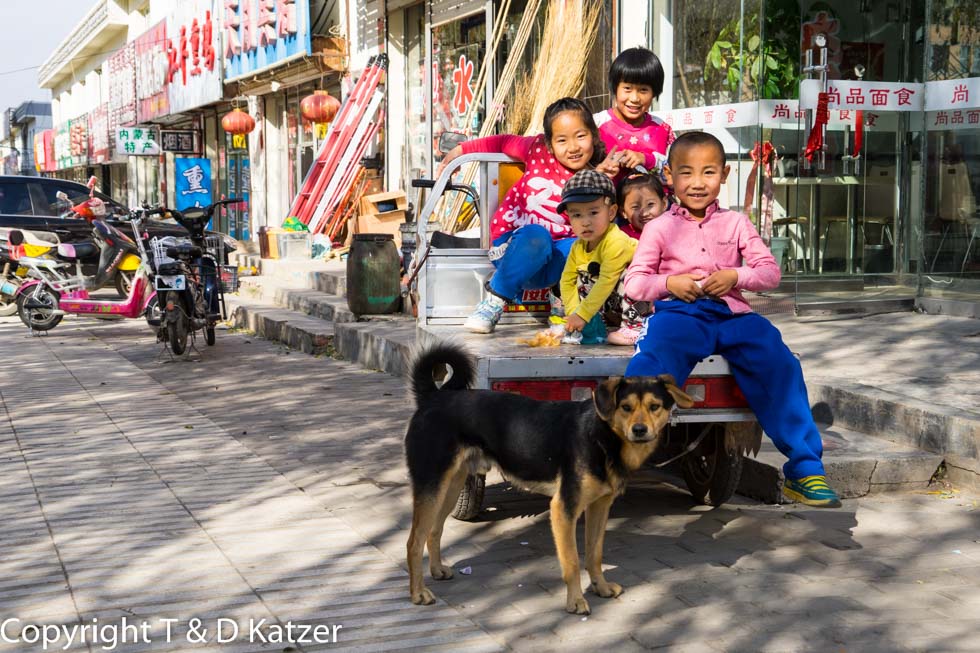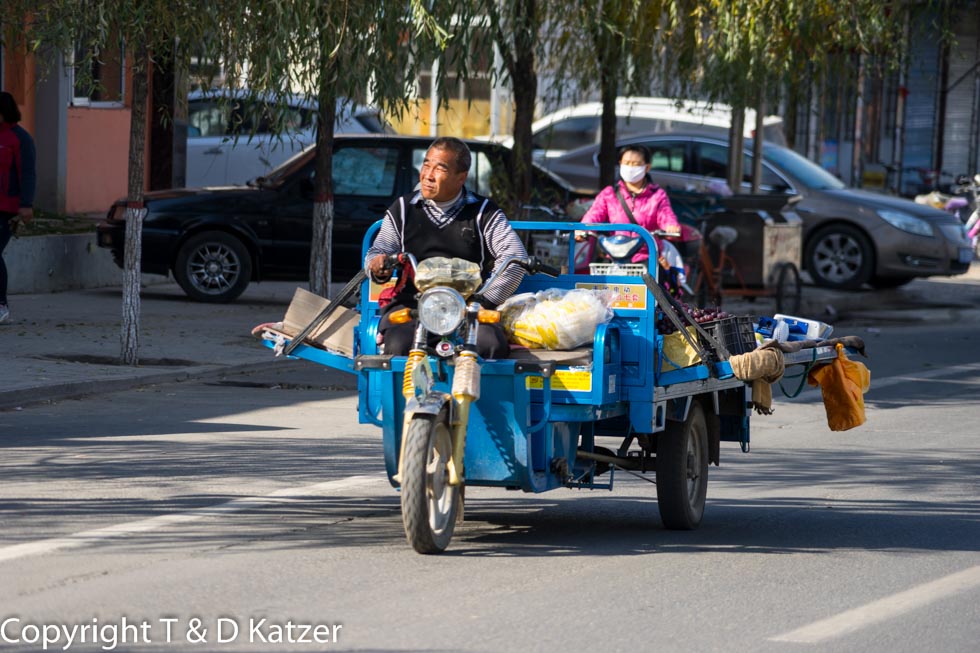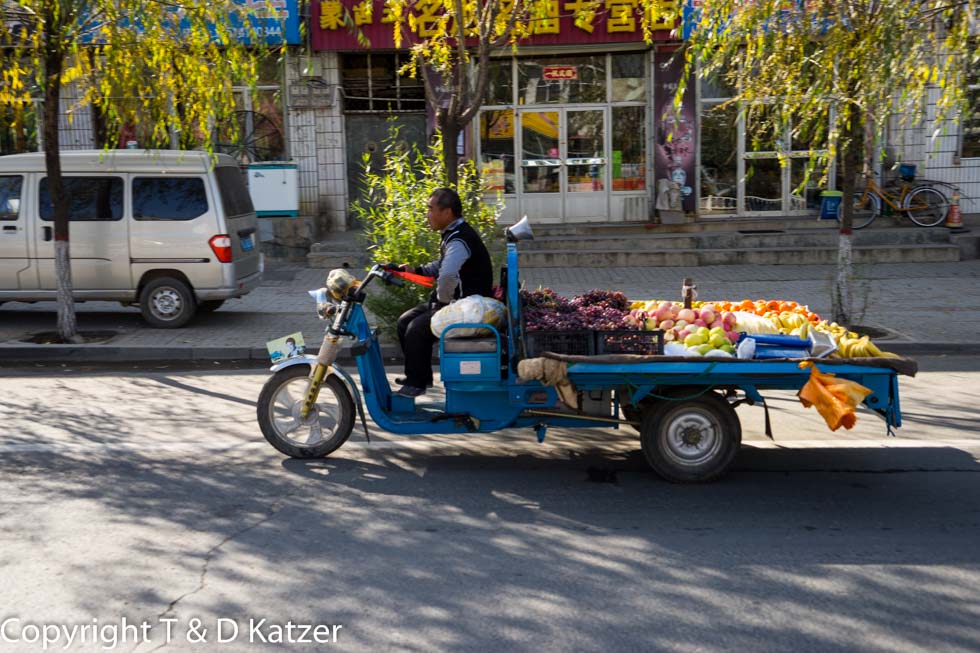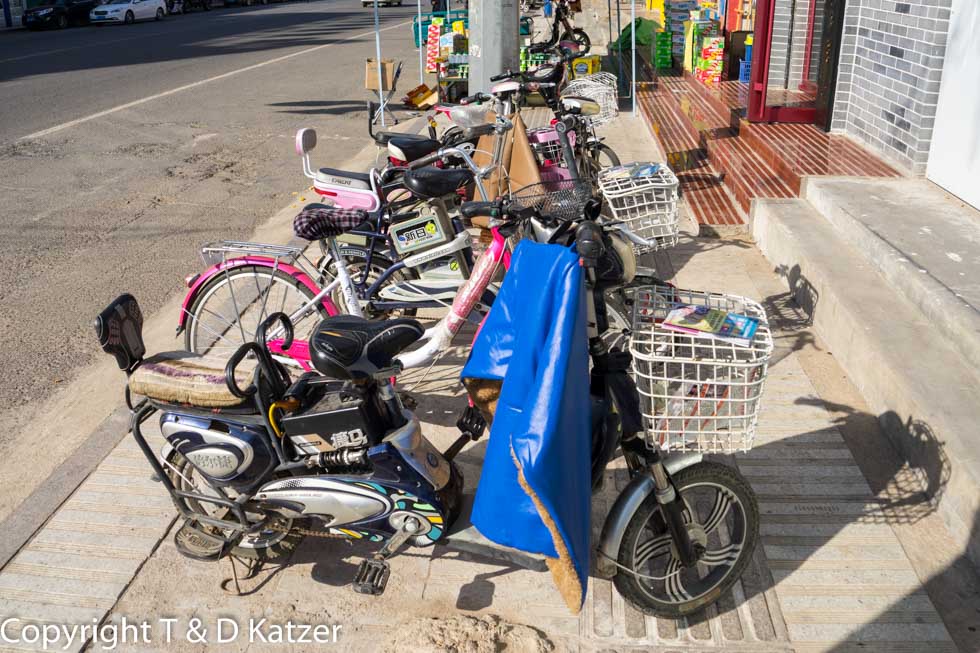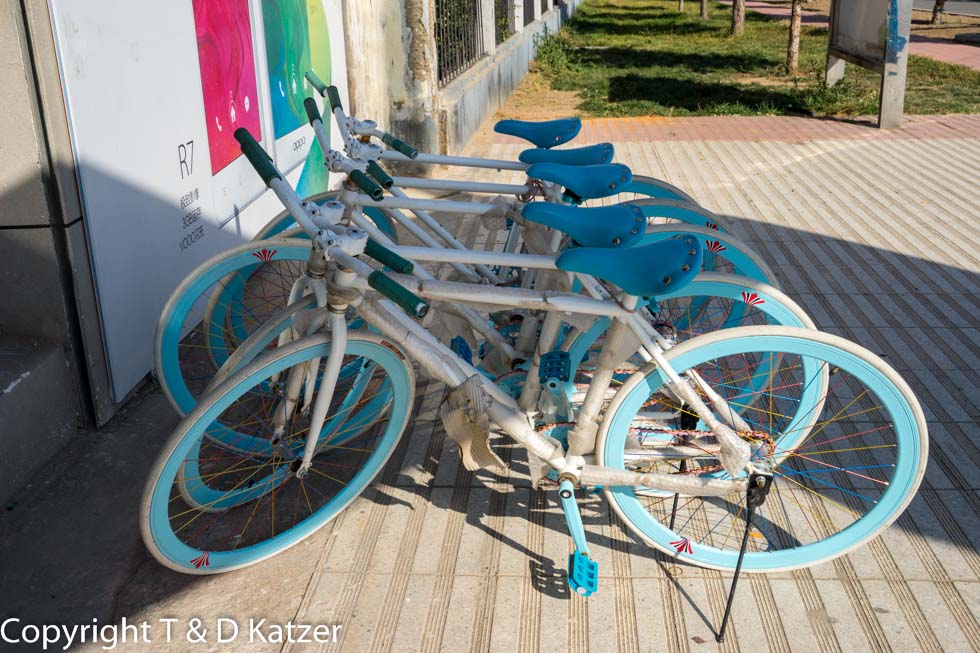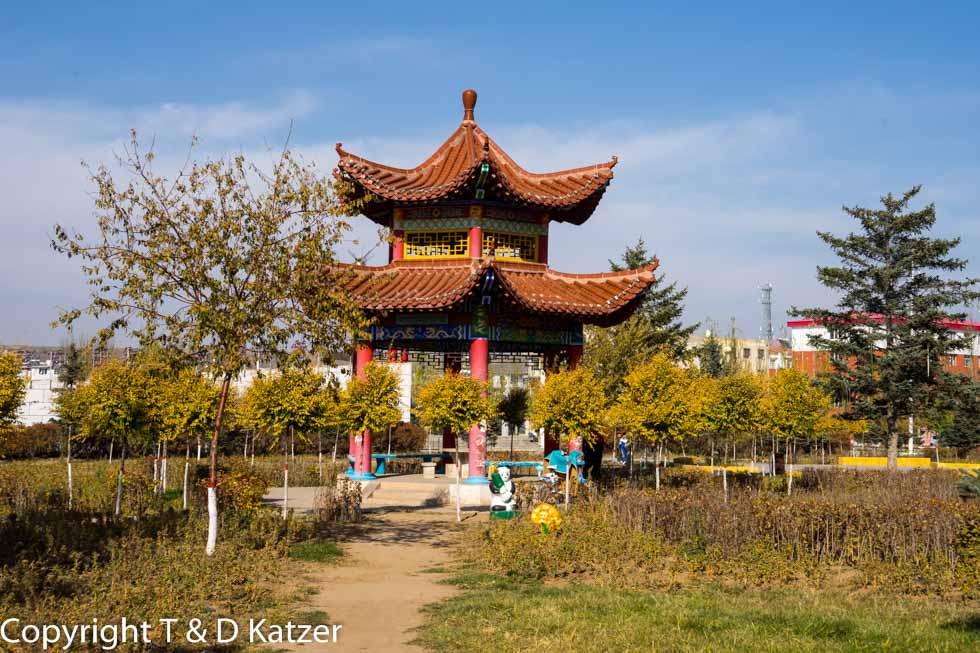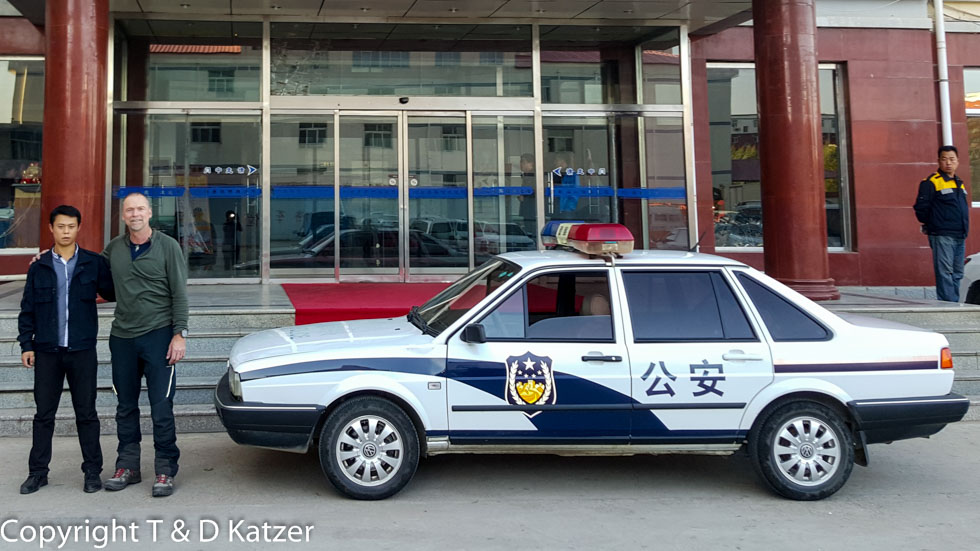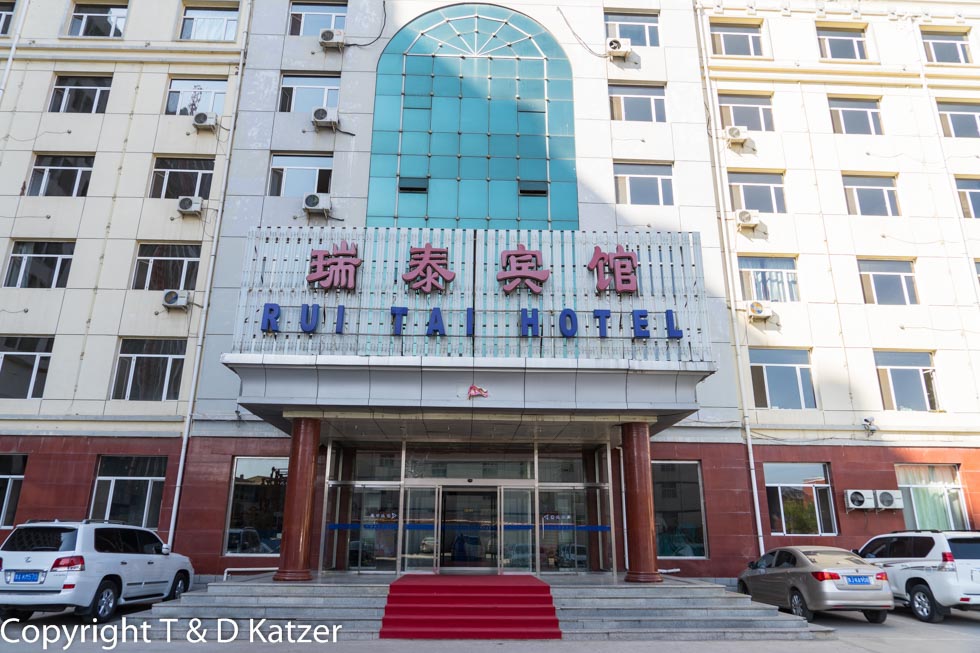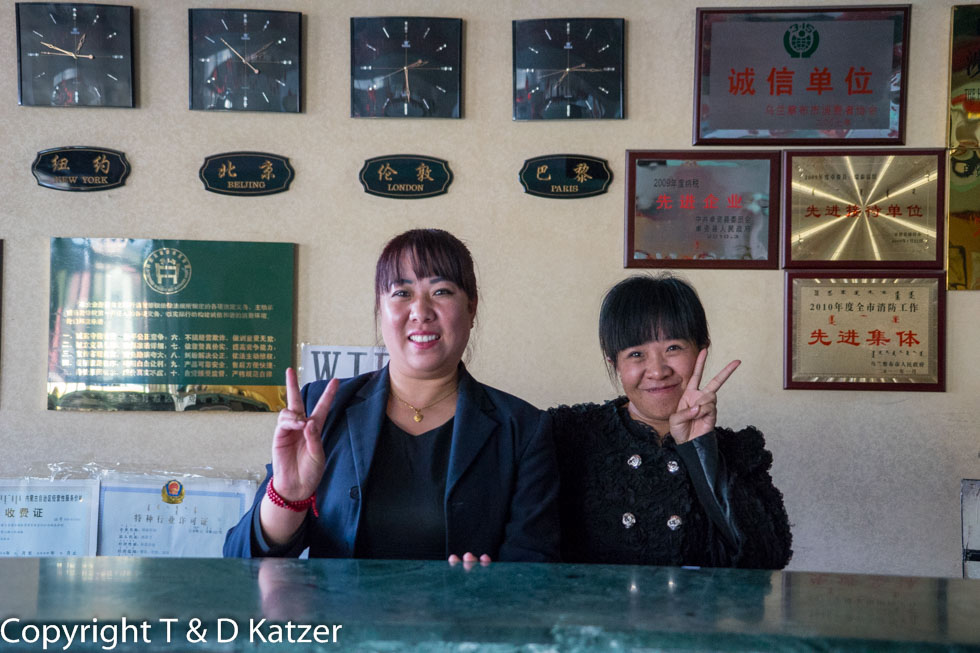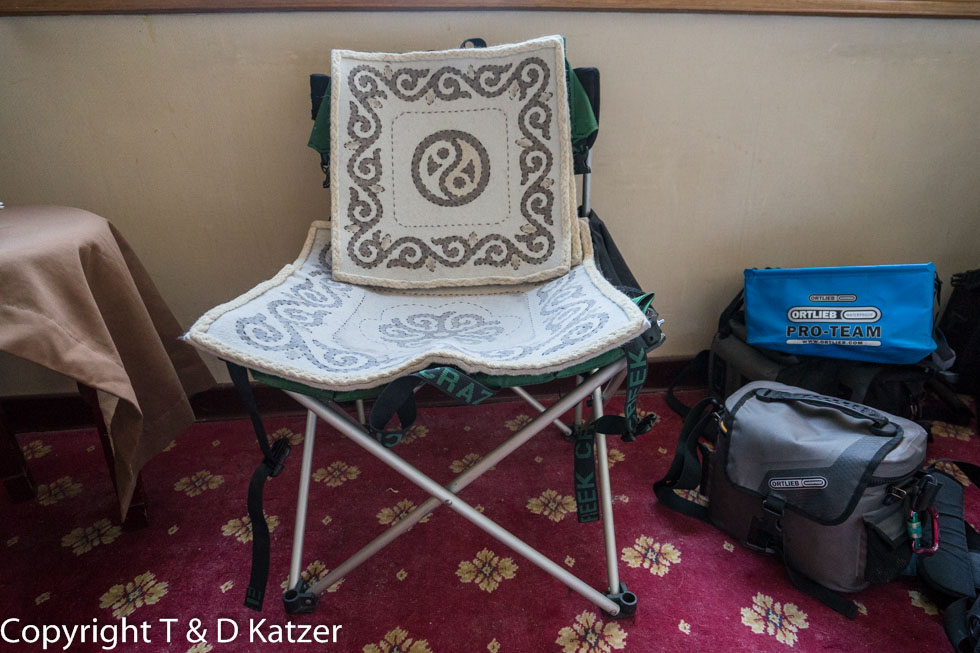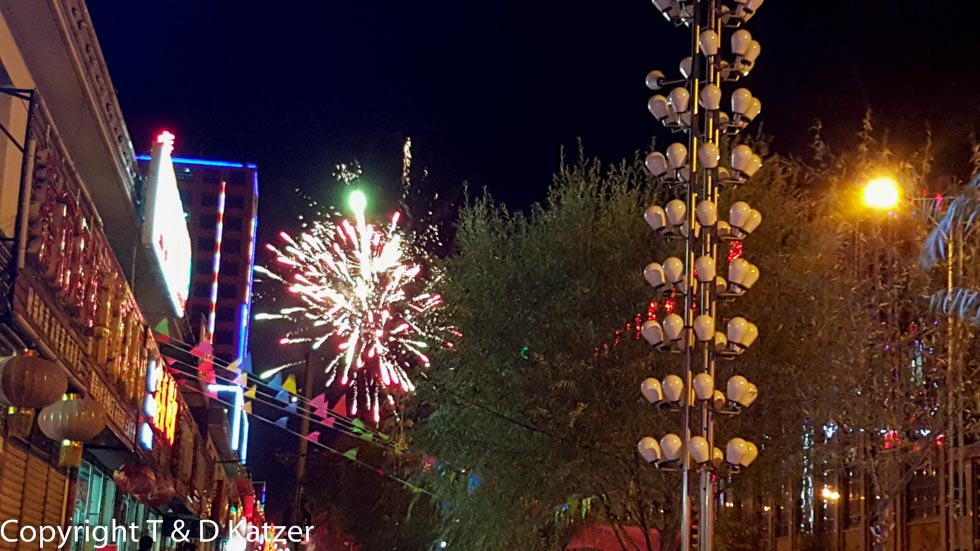
Close to despair
N 40°53'16.1'' E 112°34'18.0''
Date:
15.10.2015 until 18.10.2015
Day: 109 – 112
Country:
China
Location:
Zhuozishan
Latitude N:
40°53’16.1”
Longitude E:
112°34’18.0”
Daily kilometers:
55.36 km
Total kilometers:
9,772 km
As the crow flies:
47.41 km
Average speed:
18.1
Maximum speed:
40.5 km/h
Travel time:
3:06 hrs.
Soil condition:
Asphalt
Maximum height:
1.550 m
Total altitude meters:
5.145 m
Altitude meters for the day:
120 m
Headwind Wind force: 6
40 km/h
Sunrise:
06:39 h to 06:42 h
Sunset:
5:52 pm to 5:47 pm
Temperature day max:
20 °C
Night temperature:
2 °C
Departure:
09:30 a.m.
Arrival time:
5:30 pm
Total plate tires:
8
Plate front tire:
2
Flat rear tire:
5
Plate trailer tire:
1
(Photos of the diary entry can be found at the end of the text).
As we pack up in the morning, another group of people gathers around us. They watch with interest as I adjust Tanja’s brake lever because for some reason it rubbed against the gear cable yesterday. Fortunately, it’s only a minor issue and such repair work is part of the daily routine before setting off.
“Nali you Hohhot?”, (Where is Hohhot) I ask those present for directions to the city of Hohhot. The chef from the restaurant where we ate yesterday is also standing there, pointing in an easterly direction. “Dong?”, (east) I ask because we actually have to go west. “Dong, dong,” confirm a few of our viewers. “It looks like we have to drive through the city,” I say to Tanja. We say goodbye and before I set off I take another look at the bent drawbar. Hoping that it will last another few hundred kilometers, we let the pedals spin. We join the city’s traffic, ride through several tunnels, go around various traffic islands on the traffic circle and take care not to collide with one of the many silent e-bikes. “Do you know where we have to go?” calls Tanja. “Not really”, I reply, because my MAPS.ME program on my smartphone crashes from time to time. Because all traffic and information signs are written in Chinese, orientation is only possible using a compass and gut feeling, among other things. We finally reach the right arterial road of the metropolis and immediately land on the G110 expressway. During a short breather next to a petrol station, two reporters rush towards us. They take a few pictures and try to interview us in Chinese. Since I know that even the German press sometimes reports incorrectly or at least inaccurately about us, I would be really interested to know what they publish about the two cyclists.
Because we are cycling west for the first time in 1,000 km today and the wind has mostly come from the north or north-west in recent weeks, it is now blowing against us with full force. What’s more, it has become really hilly, so that the range of our batteries is no more than 25 km. Again, we don’t know where there are charging facilities. That’s why you can’t do more than fight the wind in Tour mode (level 2). With my soon to be 150 kg load, including Ajaci and the e-bike, it was a strenuous ride. “Stay in my slipstream,” I shout to Tanja. This way, we at least save a few kilometers on their batteries, which we might need at the end of the day. However, we know from Bosch that the batteries are already at Chinese customs. Once we have the new 500 watt power storage units, the greater range will certainly make things easier for us. “Wuuuooooooo!”, the heavily laden 38-ton trucks thunder past us. The earth trembles under its weight. This is by far the worst section of the entire route so far. Gone are the small desert roads of the Gobi on which cars rarely drove. As of today, we are on our first Chinese highway, which runs from west to east in the northwest of the empire and connects the cities of Ulanqab, Hohhot, Baotao and Bayannur. Just a few hundred meters further south, another huge strip of asphalt eats its way through the land parallel to our highway. It is the highway G6, called Huji Eexpressway. To be honest, this travel day has absolutely nothing to do with romance or a nice tour. But apart from the nasty headwind, the weather is perfect today. It is even pleasantly warm at just under 20 °C in the shade. As we pant uphill around another long bend, my breath catches in my throat. The majestic sight of a high mountain range almost knocks me out of the saddle. “Do we have to go over it?” Tanja soon asks in awe. “The mountain range lies to the west and since we’re heading west, we have to cross it. But I assume that the Chinese have built their roads through the valleys. Nevertheless, there’s something coming up that I can’t estimate.” “It’s about time we got the big batteries.” “Yes, I hope Bosch China can send them to some accommodation soon,” I reply, spurring my steed on.
Battery 2 is empty after 50 km. We stop to insert battery 3. “Where’s your flag?” I ask Tanja, startled because the national flags that otherwise flutter in the wind are nowhere to be seen. “The headwind of force six (40 km/h) has broken it off,” I realize. Fortunately, the rubber cord inside the linkage held the sections together and prevented the loss. While Tanja is connecting her battery to the Goal zero-charge battery connected to the solar panel, I repair the flagpole. Then we continue our journey through the dry, autumn-colored landscape.
Although there are possibilities to pitch our tent next to the highway, we can’t stay. We urgently need a rest stop where we can charge our batteries. Although there are stores and restaurants in some areas next to the G110, they are all closed as everyone has a concrete forecourt.
At 13:30 we reach the village of Zhuozishan, which is so small on the map program that I was worried about finding nothing more than a few farmhouses. “Ha, ha, ha! Farmhouses my ass,” laughs Tanja heartily as we cycle through an ultra-modern small town where even a large number of high-rise buildings stretch their crowns into the blue sky. Protected by the buildings, the wind can no longer harm us. As I dodge a bump in the road, my gaze falls on a small building right next to the road. In the corner of my eye, I spot something like a reception desk in there. Just as I have seen in all the hotels so far. “Stop!” I shout, ride onto the sidewalk and put the bike on the stand. Tanja looks at me in amazement. “I think there’s a guest house here,” I explain. Unfortunately, the door is locked. Disappointed, I turn back as a young man jumps up from behind the counter. He was obviously asleep. He immediately opens the door and invites me inside. Yes, he has a room. Yes, we are allowed to stay. Dog no problem. Bikes are allowed in the house. “Do you want to see the room?” he asks busily. “Sure,” I reply and am surprised to be offered a sun-drenched, brand new room for just 88 yuan (€12.20). “We’ll take that,” I say and can’t believe how quickly we’ve been accommodated this time. “It can work like that,” says Tanja happily. We roll the bikes around the building over a steep embankment and find ourselves in a beautiful Chinese courtyard. The young man’s father and mother help to unload the bikes and everything is carried to our current accommodation in no time at all. Because the dog trailer is, as so often, too wide for the doors, I dismantle it and lift it into a large room with the help of my father.
While Tanja takes Ajaci for a walk, I put our saddlebags on the beds in the best of moods and because the room is relatively small, I organize our equipment. Then I wash my face and hands in the brand new, clean bathroom and draw the curtain a little because of the strong sunlight. Especially because the room is at ground level and every pedestrian can see into it. Then the door opens. The senior enters the room, switches on the ultra-modern flat screen and selects a TV program. “I don’t need that,” I tell him. Never mind, television is standard in Chinese accommodation. It’s too complicated to explain to him that I hardly understand Chinese and I don’t want to watch TV. He points to the PC on the floor. You are welcome to use it,” I understand and write the Wifi code on a piece of paper. Computers are also standard in almost every accommodation. At least some of the previous accommodations had one of these things. When the man has left my accommodation again, I unpack my beloved camp chair, highly motivated to type the short notes of the day into my laptop. Even though it’s a windy chair, I love it because it’s shaped in such a way that I can sit in it for eight hours without getting terrible back pain. The chairs in shelters around the world are completely unsuitable for such work. You would end up crippled after a few weeks. I’m plugging my power strip into the socket on the wall when the mother of the house scurries into the room to make sure everything is right. She immediately brings a second towel and soap. Then she says goodbye politely and discreetly. “Yes, it can work like that,” I say and settle into my camp chair. I boot up the computer, run a few Windows updates and start typing the coordinates of the location into the log data folder when the door opens again. This time the young man appears. He is excited and immediately radiates an unpleasant energy. A bad premonition immediately makes my pulse beat faster. Waving his hands wildly, he tells me that the bags have to leave the room. Tanja is just coming in the door. Again the man points to the neatly lined up saddlebags. When we play dumb, he grabs a bag and wants to carry it out of the room. Tanja takes it from him again and puts it on the floor. Now the man is typing excitedly into his cell phone. “I think we have to go,” I say as calmly as possible, but I can feel how the situation is increasingly stressing me out. The man shows me his badge. “I’m a policeman and you have to go,” I think I understand his order. As I’m still sitting in my beloved camp chair, he holds his cell phone in front of my face. “You can’t stay. We don’t have a license for foreigners,” a translation program shows in English letters. Without comment, I get up and start packing. The policeman is not quick enough and tries to stuff my underpants into one of the pockets. Apparently he is terrified of being caught for having accommodated foreigners in his small family hotel. Who knows, maybe this could even cost him his coveted civil servant job? “It’s okay, I’ll hurry,” I try to reassure the man. “Why didn’t he know that beforehand?” asks Tanja. “Apparently he’s never had foreigners before,” I suspect. When all the bags are stacked in his police car under high pressure, my on-board computer is missing. “I must have packed it in a saddlebag in the rush,” I say, hurrying outside and clearing out the police car again. “What are you doing?” asks the policeman nervously. When I open a saddlebag, my GoPro falls onto the road. Fortunately, the lens is not damaged. “This fucking stress!” I curse and feel my whole body trembling. After a hard day of cycling on the terrible road, we thought we had arrived at a wonderful place to stay and now we are thrown out again after checking in. That simply doesn’t exist. I was firmly convinced that I didn’t need to write any more accommodation stories and now this. How many bizarre stories can a topic like this offer? “It could be worse Denis. He could have just put us on the street, but he’s taking us to another hotel. That’s very nice of him,” Tanja tries to reassure me. “Yes, very nice.” Then I trudge into the backyard of the small property and, with my father’s help, get the bikes and trailers out of the room. I have just dismantled everything and am putting the trailer back together again. Let no one say that life on the road is easy. Serenity, tolerance, patience, acceptance – you can learn all that if you have the nerve. “Om”, I whisper the Buddhist mantra quietly to calm myself down. I stow the new tires on the dog trailer in a makeshift manner. Everything is mixed up because of the rush. That’s exactly how you lose your things, I think to myself. We haven’t finished loading my bike yet when father and son are already pushing Tanja’s bike and trailer up to the road. As if that would give you a time advantage.
Then we are also on the street in front of the guest house. I shake my father’s hand and cycle off, always following the police car. Tanja clung to my rear wheel. Just a few hundred meters further on, our hectic and nervous ex-host stops in front of a fat hotel. “Looks really classy,” I say, wondering what we’re being charged for a room here. But do we have any other choice? By now it’s 5:30 p.m. and the evening chill is being blown between the house fronts by the wind. The policeman jumps like a weasel into the entrance hall of the RUI TAI HOTEL. Our stay is quickly clarified. Startled, I look at the board on which the room prices jump out at me. They are between 300 (41.59 €) and 550 yuan. (€76.24) “Expensive,” I say. The policeman waves him off. He speaks to the ladies at reception and they quote me a price of 120 yuan (€16.63). You don’t have to understand everything, I think to myself. A mountain of equipment piles up in the lobby in no time at all. Our bikes are in the middle of it all. The guests have to straddle around the outside. To prevent the mood from changing, we push the bikes to the side, behind the obligatory sofas that seem to be in every hotel lobby, and cover them with a tarpaulin. The policeman says goodbye. We take a few more photos. Because of the rush with my cell phone. Then he darts away. “It wasn’t so bad after all,” says Tanja as we walk back into the reception room of the RUI TAi to collect our room key. One of the many receptionists points to the sofas and says: “Please wait there.” “Not again,” I groan. We sink into the couch and wait and wait and wait. Maybe it’s not comprehensible now, but at this point I’ve had enough. Everything was fine at first. An interesting country with nice people and now this bullshit from the authorities. “I’ll call Spring. This can’t go on forever. They’ll throw us out again in the end,” I say, exasperated. “Yes Denis? How can I help you?” she asks after a brief preliminary discussion so as not to open the door straight away. I explain the situation and hand my cell phone to the hotel manager, who looks serious. After a while, the lady hands me my phone again. “They don’t know if the hotel has a license for foreigners. They’re also fully booked. You should sit down and wait,” explains Spring. “Fully booked? That can’t be right. They’re really killing me. Why didn’t they say so straight away? And what are we supposed to wait for? We are dog-tired, the last thing we ate was breakfast. We drove almost 60 km on a dangerous highway, unloaded the bikes, carried everything into a room, carried everything out again, reloaded some of the bikes and put all our stuff in the lobby. We are tired. We have nowhere to go. That’s not your problem and it’s not your fault, but I just wanted to describe the situation. Besides, the policeman said they have a license here.” “The policeman probably just wanted to get rid of you. He didn’t know if they had a license himself. Why don’t you give me the manager again?” “Okay, I will,” I reply and hand my phone to the scowling Chinese woman. After a while, I speak to Spring again. “Please hand them your passports. They’ll let you into a room for the time being.” “How did you manage that? Super! Thank you very much.” “Oh, Denis?” “Yes?” “Give me the manager again, please.” “Okay, I will.” Minutes later I hear that our dog is not allowed. “They’re afraid he might bite someone.” “Jump, you know he’s very good-natured.” “I know that. Show the ladies at reception what I wrote about Ajaci.” “Okay, I will. Completely unexpectedly, everyone is smiling now and, apart from the manager, five women storm off, load our belongings onto a luggage trolley and push it into the elevator. Because the elevator is full, we take the next one after it. We are accommodated in the last room on the sixth floor. It’s not exactly clean but we’re in. “What an odyssey,” I gasp exhaustedly and sink into one of the worn, rickety chairs. “Will we be allowed to stay?” asks Tanja. “I think so,” I reply and start sorting my luggage, just as I did hours ago. “Where’s my camp chair?” I ask. “I don’t know. Maybe in the big bag?” “It doesn’t fit in there.” “Maybe it’s still on the trailer?” “I’m sure it is,” I say with relief and head downstairs to get the equipment I need.
“It’s not on the trailer,” I say when I’m back in the room. “Nobody will steal it here,” says Tanja confidently. “I assume so, but he’s gone,” I reply and search under the beds and behind the wardrobe again. “He’s gone,” I repeat and could cry. “I probably loaded it onto the trailer in the rush and didn’t tie it down. Now it’s lying somewhere on the street or a Chinese person has decorated his home with it.” “You can’t decorate a home with a folding chair.” “Never mind, you know what I mean. It’s definitely gone. And how should I write now? Is that a sign to stop this stupid writing? It takes up a lot of time anyway. Maybe we should travel like so many others and stop reporting? Then the weight problem would be solved immediately. No laptops, cameras, tripods, chargers, no crashing software, no stupid updates, no perpetual squatting around in a stupid folding chair.” “Denis, it’s your job as an ambassador for Mother Earth to document our journey in text, images and film. It’s your life’s work. Isn’t it?” “Yes, yes, life’s work. If I really am an ambassador for Mother Earth, then I wonder why Mother Earth sometimes makes it so difficult for us?” “Give me a break. We’re doing fantastic. We’re being helped everywhere. People are accommodating and friendly. Even Ajaci crossed the border without quarantine. Please don’t forget that.” “It’s fine, but at the moment I’m just fed up. Where am I supposed to get one of these damn chairs? Apart from that, what do our readers think when I write about how important the chair is for my work? They think he’s got a wheel off. Or now it’s completely crazy. They shouldn’t get so upset about a folding chair like that. “I could imagine that the chair is still in the police car,” Tanja changes the subject. “In a police car? I can’t imagine. I’ve just checked again.” “I’m going to head off straight away and walk to the last accommodation. Maybe we’ll get lucky,” she says, takes a photo of our tripod bag, which looks similar to the chair cover, puts on her jacket and leaves the room.
20 minutes pass when my cell phone rings. “The policeman’s family says they don’t steal, but I think they misunderstand me. I showed them the photo with the tripod bag and they called their son. He’s not here at the moment but he’ll be in touch soon,” Tanja gives an interim report. Only a few minutes pass when the doorbell rings again. “Denis?” “Yes?” “Now take three breaths. Your beloved chair is here. The policeman just rode up on his bike and brought it to me. It was actually still in the footwell of the police car.” “Wow. Great. You’re a sweetheart. Then that wasn’t a sign to stop writing,” I say, laughing with relief. “Let’s go for a meal,” Tanja suggests. “Let’s go for a meal,” I reply and feel the tension and emerging doubts of the past few hours fall away from me…
The live coverage is supported by the companies Gesat GmbH: www.gesat.com and roda computer GmbH www.roda-computer.com The satellite telephone Explorer 300 from Gesat and the rugged notebook Pegasus RP9 from Roda are the pillars of the transmission.
